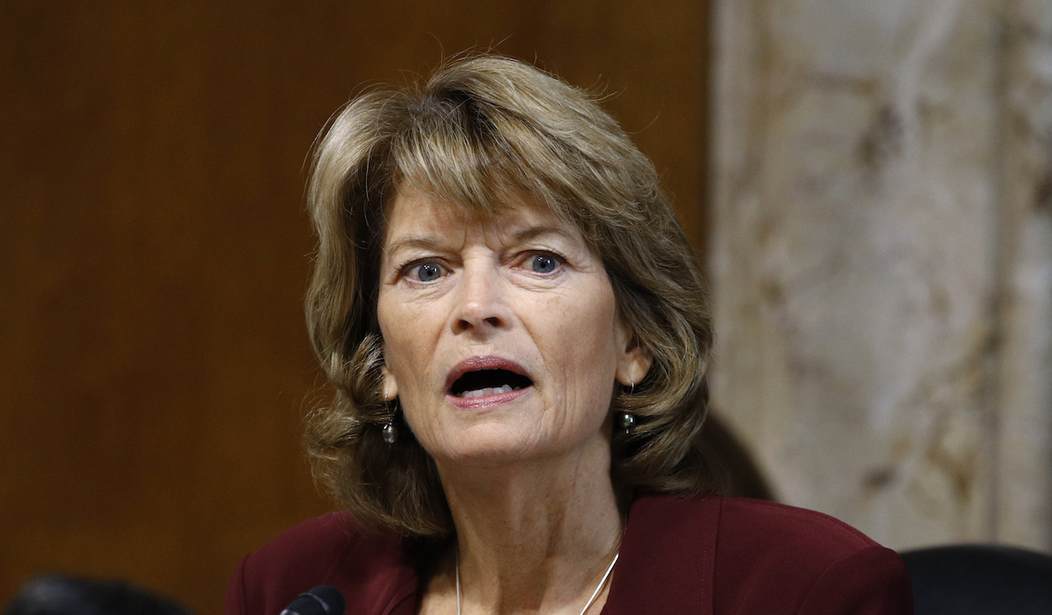Sen. Lisa Murkowski (R-AK) is another thorn in the side of the conservative base. She’s the female version of Mitt Romney. At the same time, I can see why she has a "give no $%*ks" attitude. She’s beholden to no one.
After losing the GOP primary in 2010 to Joe Miller, she continued to campaign as a write-in candidate…and won. Since then, I can see why she’s a bit more independent, but good Lord lady did you really have to make things so difficult during the Kavanaugh confirmation battle? She was also a temporary procedural obstacle during Amy Coney Barrett’s nomination to the Supreme Court. She eventually backed the now-justice after Republicans gathered enough votes to send ACB’s nomination to the floor for a full vote. Donald Trump has certainly had enough of her and has made it his mission to clip her in the 2022 elections, which is why Roll Call reports the Alaska Republican might simply not run for re-election:
Sen. Lisa Murkowski is still weighing whether to run for a fourth full term, and she demurred Tuesday on a timeline for her decision. The Alaska Republican told reporters at the Capitol that she will make her final decision “when I make it.”
“I have been doing everything that a good incumbent does in terms of preserving my options, visiting with Alaskans, spending a lot of time, as much time on the ground as I can, and raising money,” Murkowski said.
Former President Donald Trump, who won Alaska by 10 percentage points in November, has vowed to campaign against Murkowski. The senator has frequently criticized the former president and voted to convict Trump after his impeachment for inciting an insurrection on Jan. 6.
Late last month, Murkowski drew her first GOP challenger, Kelly Tshibaka, the head of Alaska’s Department of Administration. Tshibaka has been working with some members of Trump’s former campaign team, Politico reported.
Recommended
Yet, being a moderate, Murkowski just might not be up for the fight. Moderates on the Hill leave. They complain about partisanship and then do what these spinless actors always do—flee for the hills and then find a nice job in the private sector. She has already expressed her extreme dislike for Trump with The Washington Post back in January and threatened to leave the party altogether. That’s fine. If she becomes a Democrat, she can be hated by folks on both sides. Yet, there is one thing that could help her stay in DC. Alaska’s new voting system:
First, a quick primer on ranked-choice voting: Ranked-choice voting lets voters mark their first-choice candidate first, their second-choice candidate second, their third-choice candidate third, and so on. Each voter has only one vote but can indicate their backup choices.
If one candidate has an outright majority (more than 50 percent) of first-place rankings, that candidate wins, just like a traditional election. But if no candidate has a majority in the first round, the candidate in last place is eliminated. Voters who had ranked that candidate first have their votes transferred to their backup — that is, the candidate they ranked second.
In a single-winner election (now used in Maine, Alaska, San Francisco and the Australian House, among other places), the ranking transfer process continues until a single candidate gathers a majority.
In other words, Murkowski has the option of running as an independent in 2022 or forming her own party. She can then attract votes from Democrats and Republicans, while allowing her Democratic and Republican supporters to still have a backup vote for a Democrat or Republican, ensuring the vote won’t be wasted if Murkowski finishes third in the initial round.
This is very different from the simple plurality-winner elections held in many other parts of the United States. Ranked-choice voting encourages candidates to focus on more than just their base.
That could explain why she voted to confirm the DOJ nomination of Vanita Gupta who is a total crackpot.

























Join the conversation as a VIP Member